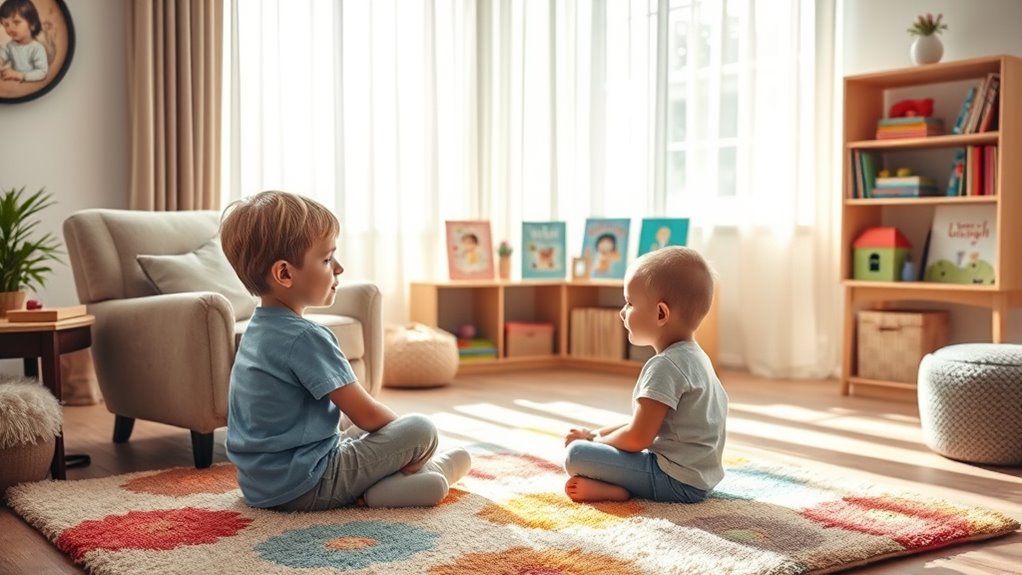Working with a child therapist can greatly enhance your co-parenting efforts by improving communication with your child, building emotional resilience, and addressing behavioral needs. A therapist helps you develop clear, supportive messages that foster emotional security and openness. They also guide you in managing your own emotions, reducing conflict, and creating a more harmonious family environment. To explore effective strategies and gain deeper insights, keep exploring how a therapist can support your co-parenting journey.
Key Takeaways
- A child therapist can facilitate improved parent-child communication, ensuring messages are age-appropriate and emotionally supportive.
- They help both parents develop emotional resilience to manage stress and model healthy emotional regulation.
- A therapist guides co-parents in implementing proactive strategies to de-escalate conflicts and foster mutual understanding.
- They support the child’s emotional security, promoting open expression and a stable environment during family transitions.
- Working with a therapist enhances overall co-parenting dynamics, focusing on progress and prioritizing the child’s well-being.

Managing co-parenting can be challenging, especially when emotions run high or communication breaks down. It’s common to feel overwhelmed by the constant need to coordinate with your ex and prioritize your child’s well-being. Working with a child therapist can provide valuable support, helping you navigate these difficulties while fostering healthier relationships. One of the key areas a therapist focuses on is parent-child communication. When you engage with a therapist, you learn techniques to improve how you connect with your child, ensuring your messages are clear, supportive, and age-appropriate. This skill is vital because effective communication lays the foundation for your child’s emotional security. As you develop better ways to talk with your child, you’ll notice they become more open, expressive, and willing to share their feelings. This, in turn, creates a positive cycle that enhances your overall co-parenting dynamic.
Therapists help improve parent-child communication, fostering emotional security and healthier co-parenting relationships.
A child therapist also helps you build emotional resilience—not just for your child, but for yourself too. Co-parenting often comes with a rollercoaster of emotions: guilt, frustration, sadness, or anger. A therapist guides you through managing these feelings in a healthy way, so you don’t inadvertently transfer your stress onto your child. By strengthening your emotional resilience, you can stay calm in challenging moments, model patience, and provide a stable environment. This emotional stability reassures your child and helps them feel safe and supported, even amid family changes. Additionally, understanding the importance of vibrational energy can help you maintain a positive mindset and attract healthier co-parenting experiences.
Working with a therapist also encourages you to adopt a proactive approach to co-parenting. Instead of reacting impulsively during conflicts, you learn strategies to de-escalate tense situations and communicate more effectively with your ex. This collaborative mindset benefits your child because they witness healthier interactions. The therapist may suggest joint sessions with your co-parent, fostering mutual understanding and agreement on parenting styles. Such cooperation creates a consistent environment for your child, reducing confusion and emotional turmoil.
Ultimately, partnering with a child therapist can transform your co-parenting experience. It equips you with essential skills to enhance parent-child communication and develop emotional resilience. As you become more confident in managing your emotions and engaging positively with your child, you’ll notice a more harmonious family dynamic. Your child benefits from your growth, feeling more secure and understood. This process isn’t about perfection but progress—building a supportive framework that prioritizes your child’s emotional health while helping you navigate the complex realities of co-parenting.
Frequently Asked Questions
How Do I Choose the Right Child Therapist for Co-Parenting?
To select the appropriate child therapist for co-parenting, start by researching therapists with specialized credentials in family or child therapy. Look for those whose therapy approaches—like play therapy or family systems—align with your child’s needs. You should also feel comfortable with their communication style and approach. Trust your instincts and ask about experience working with co-parenting issues to make sure they can provide effective guidance.
What Signs Indicate My Child Needs Therapy?
Imagine your child’s smile fading like sunset colors turning dark—this signals they might need therapy. Notice if their behavior shifts dramatically, like frequent emotional outbursts or withdrawal from friends and activities. These changes often point to underlying issues. If your child’s mood swings or behavioral changes persist, it’s time to seek help. Recognizing these signs early can guide you to a child therapist who provides the support your child needs to thrive.
How Often Should Therapy Sessions Be Scheduled?
You should schedule therapy sessions based on your child’s needs, typically once a week or biweekly for ongoing support. This frequency helps your child process emotions effectively and build coping skills. As they progress, your child’s therapist might recommend adjusting the session frequency. Consistent sessions guarantee your child receives steady guidance, fostering emotional resilience and improving co-parenting dynamics. Regular check-ins with the therapist help tailor ongoing support to your child’s evolving needs.
Can Therapy Help Improve Communication Between Co-Parents?
Yes, therapy can considerably improve communication between co-parents. A therapist helps you identify and break down communication barriers, making it easier to share information clearly. They also support emotional regulation, so you can stay calm during difficult conversations. This process fosters understanding and cooperation, ultimately creating a healthier environment for your child. With guidance, you’ll develop better ways to work together, reducing conflicts and strengthening your co-parenting relationship.
What Should I Do if My Co-Parent Is Resistant to Therapy?
You might think therapy is unnecessary, but emotional resistance and therapy stigma can hinder your co-parenting progress. If your co-parent resists, try to understand their concerns without judgment, and gently share how therapy can benefit both of you and your child. Keep communication open and respectful, emphasizing that the goal is a healthier environment for your child. Sometimes, patience and empathy can open the door to cooperation.
Conclusion
Working with a child therapist can transform co-parenting from stressful to collaborative. Imagine reducing conflict by nearly 60%, allowing your child to feel more secure and loved. When you partner with a therapist, you’re not only gaining guidance but also creating a healthier environment for your child to thrive. Remember, seeking support shows strength and dedication—your efforts can lead to a more harmonious family dynamic and brighter future for everyone involved.










